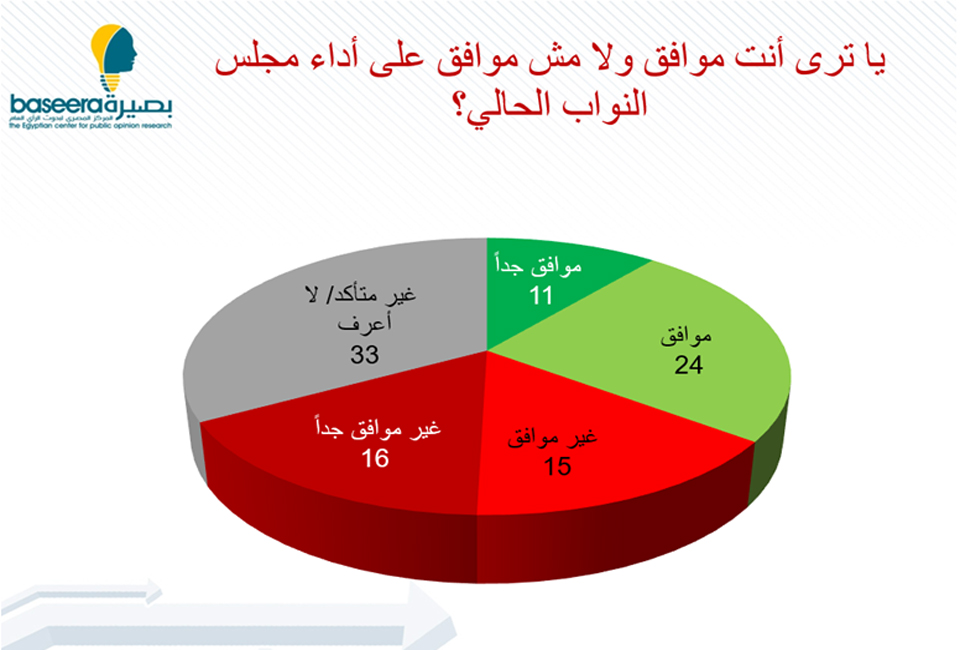ثلث المصريين فقط يوافقون على أداء البرلمان
الريف أكثر رضا عن أداء نواب البرلمان مقارنةً بالحضر
Gallery

أجرى المركز المصري لبحوث الرأي العام بصيرة استطلاعاً لرأي المصريين حول تقييمهم لأداء مجلس النواب، حيث شمل الاستطلاع أسئلة حول تقييم المصريين لمجلس النواب وكذلك تقييم كل مستجيب لأداء ممثلي دائرته في البرلمان. وتعد هذه هي المرة الأولى التي ينشر فيها مثل هذا الاستطلاع.
وتوضح نتائج الاستطلاع أن الشارع المصري منقسم حول تقييم أداء مجلس النواب في نهاية الشهر الرابع لانعقاده بصورة شبه متساوية حيث بلغت نسبة الموافقين على أدائه 35% بينما بلغت نسبة غير الموافقين 31% وبلغت نسبة الذين لم يستطيعوا التحديد 33%.
وتنخفض نسبة الموافقين على أداء مجلس النواب بارتفاع المستوى التعليمي حيث تبلغ نسبة الموافقين على أدائه 43% بين الحاصلين على تعليم أقل متوسط وتنخفض إلى 20% بين الحاصلين على تعليم جامعي أو أعلى.
ويعد المصريين في الفئة العمرية 30-49 سنة هم الأقل موافقة على أداء مجلس النواب حيث تبلغ نسبة الموافقين بينهم 30% مقارنةً بحوالي 36% بين الشباب 18-29 سنة و42% بين الذين بلغوا 50 سنة فأكثر.
وقد تم سؤال المستجيبين عن مدى موافقتهم على أداء ممثلي دوائرهم الانتخابية في مجلس النواب وفي دوائرهم، وتشير النتائج إلى أن 39% من المستجيبين موافقين، و27% غير موافقين و33% أجابوا بأنهم لا يعلمون.
وترتفع نسبة من يوافقون على آداء نواب دوائرهم من 29% في الحضر إلى 49% في الريف، وتنخفض نسبة من أجابوا بأنهم لا يستطيعون التحديد من 39% في الحضر إلى 29% في الريف، ويمكن عزو ذلك إلى أن سكان الريف يكونون على معرفة بالنائب شخصياً بصورة أكبر من الحضر مما يساعدهم على تقييم أدائه. ويعد سكان الوجه البحري الأعلى موافقةً على أداء نواب دوائرهم حيث تبلغ نسبة الموافقة بينهم 45% مقابل 41% في الوجه القبلي و25% في المحافظات الحضرية.
وتنخفض نسبة الموافقين على أداء نواب دوائرهم من 49% بين الحاصلين على تعليم أقل من متوسط إلى نصف هذه النسبة بين الحاصلين على تعليم جامعي أو أعلى لتبلغ 25%.
منهجية الاستطلاع:
إعمالاً لمبدأ الشفافية والتزاماً بأخلاقيات نشر الاستطلاعات يفصح المركز عن منهجية إجراء الاستطلاع وهي كما يلي:
تم إجراء الاستطلاع باستخدام الهاتف المنزلي والهاتف المحمول على عينة احتمالية حجمها 1541 مواطناً في الفئة العمرية 18 سنة فأكثر غطت كل محافظات الجمهورية، وقد تمت كل المقابلات الفترة من 18 إلى20 أبريل 2016. وبلغت نسبة الاستجابة حوالي 46%، ويقل هامش الخطأ في النتائج عن 3%.
وقد تم تمويل الاستطلاع من الموارد الذاتية لبصيرة ولم يتلق المركز تمويل من أي جهة مقابل إجراء الاستطلاع.
للحصول على مزيد من التفاصيل حول النتائج والمنهجية المستخدمة أو للحصول على العرض البياني للنتائج يمكن الرجوع للموقع الإلكتروني www.baseera.com.eg .
أداء مجلس النوابتنزيل ملف الأستطلاع



































